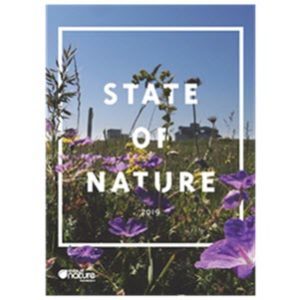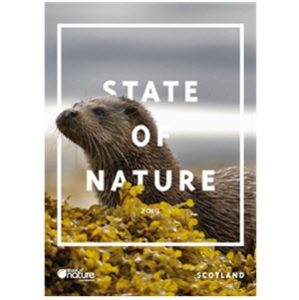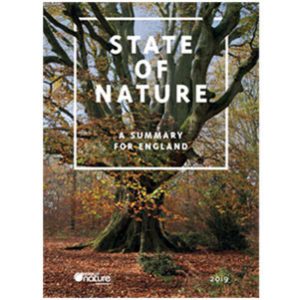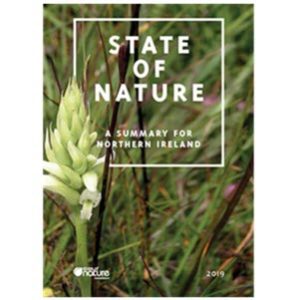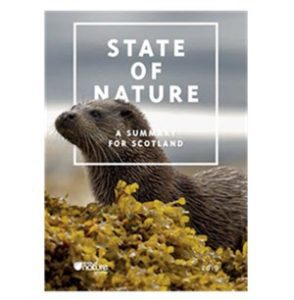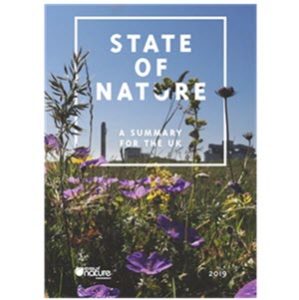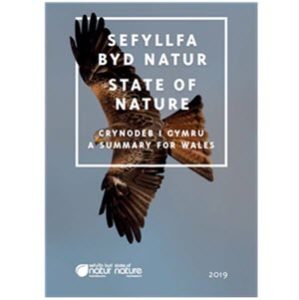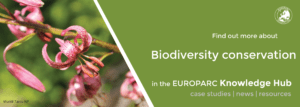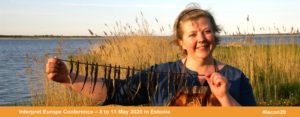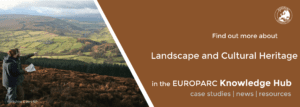State of Nature 2019 Reports reveal human impacts on wildlife in the UK
Source: National Biodiversity Network website
The British National Biodiversity Network (NBN) published a series of documents – State of Nature 2019, highlighting links between climate change, nature and sustainability, and revealing how human impacts are driving sweeping changes in wildlife in the UK.
#STATEOFNATURE
Collating the best available data on the UK’s biodiversity, the State of Nature 2019 Reports present an overview of how the country’s wildlife is faring. The authors look back over nearly 50 years of monitoring to see how nature has changed in the UK, its Crown Dependencies and Overseas Territories.
Produced by a partnership of more than 70 organisations involved in the recording, researching and conservation of nature in the studied area, the report particularly focuses on what has happened in the last decade, and so whether things are getting better or worse for nature.
By 2020 most targets of the Convention on Biological Diversity won’t be met.
In a complex way, the report assesses the pressures that are acting on nature, and the responses being made, collectively, to counter these pressures.
Key findings
Thanks to new data sets becoming available and the development of new analytical tools, State of Nature 2019 is able to present trends in status for more species than ever before.
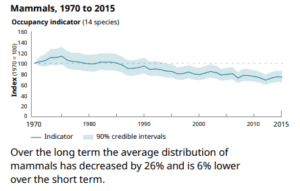
Source: State of Nature 2019
Their statistics demonstrate that the abundance and distribution of the UK’s species has, on average, declined since 1970 and many metrics suggest this decline has continued in the most recent decade. There has been no let-up in the net loss of nature in the UK.
41% of species have decreased in abundance.
It should also be noted that prior to 1970, the UK’s wildlife had already been depleted by centuries of persecution, pollution, habitat loss and degradation.
The report concludes that, although progress has been made, the UK will not meet most of the Convention for Biological Diversity’s 2020 Aichi targets.
Download the Reports
Click the images to download the Report and summaries for different countries of the UK. Source: National Biodiversity Network website.
Interpret Europe: Call for Papers on Heritage Communities
‘Fostering heritage communities’ is the title of the next Interpret Europe Conference that will take place from 8 to 11 May 2020 in Haapsalu, Estonia. Interpret Europe now accepts proposals for presentations and interactive workshops! Read about previous events of Interpret Europe here.
What is heritage interpretation?
Heritage interpretation supports visitors of heritage sites as well as local people in their search for meaning in heritage. While many parks, monuments and museums might agree that a lively heritage community is invaluable for their site, they often feel challenged by debates with local people and by engaging with volunteers in interpretation, who all bring their own issues and opinions to the site.
Heritage lives through the people dedicated to it. What role could such communities play in interpreting natural and cultural heritage?
The Interpret Europe Conference intends to bridge that gap between abstract concepts such as participation and citizenship building and the very practical need to ‘get things done’. It seeks to explain the ideas behind contemporary approaches to heritage interpretation and to exchange experiences of practitioners how to bring the theory to earth.
Considering the political background, the conference intends to bring, especially, two European conventions to life: the Faro Convention and the Florence Convention.
Questions
What do heritage communities and landscape mean for heritage interpretation? In relation to the conference title ‘Fostering heritage communities’, Interpret Europe invites proposals for presentations and interactive workshops that particularly address one or more of the following questions:
- What turns the living experience of heritage into a process fostering active citizenship?
- How can we involve favourable as well as critical stakeholders with heritage communities?
- How can we encourage people to reflect upon heritage sites from different perspectives?
- How can co-creation of interpretation help people to understand heritage?
- What role do acknowledged experts play if other stakeholders start to interpret heritage?
- Can anybody be an interpreter?
- What triggers engagement and boosts a sense of fulfillment for volunteer interpreters?
- Considering a shift of paradigms, what new qualities does interpretive training need to have?
- Are values of heritage defined by communities, or do communities enhance the value of heritage?
- How do the Conventions’ concepts of heritage and heritage communities compare to current theories of heritage interpretation, and what conclusions can we draw from that?
Interpret Europe also welcomes presentations and workshops that focus on the theory and practice of heritage interpretation as a discipline. Besides theoretical essays, descriptions of case studies of outstanding sites, or remarkable practices are welcome. Remember to fulfil the following requirements.
Format
Interpret Europe conferences attract up to 200 attendees from as many as 40 countries. Besides four keynote addresses in the plenary, 60-80 workshops and presentations are run in parallel, in different strands. The call refers to these parallel sessions.
Presentations can be 25 or 55 minutes long including ten minutes for exchanges of views. Keeping presentations as short and as inspiring as possible is recommended. Workshops can be 55 or 85 minutes long and need to be differentiated by ensuring the active involvement of the participants.
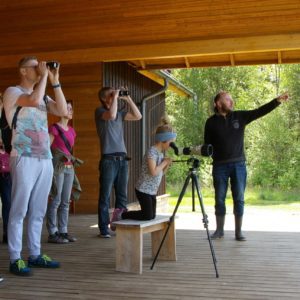
Source: Interpret Europe
A dedicated Review Team will consider all paper abstracts and decide whether they are a sufficient basis for a workshop or presentation.
Submissions
Please submit an abstract of your presentation or interactive workshop by 1 February 2020 using the template on www.interpreteuropeconference.net/call-for-papers. You will find all information about requirements for this abstract there.
Conference proceedings will be published on the IE website from the day that the conference begins. They will have their own ISBN and include all full papers received by 15 April 2020.
Delivering a full paper is not mandatory for giving a presentation or workshop. Either can also be based on the paper abstract. Paper abstracts are published as part of the proceedings.
Contact
The Conference ‘Fostering heritage communities’ will be organised by Interpret Europe’s institutional member SALM, the Foundation of Haapsalu and Läänemaa Museums.
If you have any questions, please contact Conference Manager, Karin Mägi from SALM: karin.magi@interpreteuropeconference.net.
Lear more about Heritage Communities
Heritage communities are a cornerstone of the Council of Europe’s Framework Convention on the Value of Cultural Heritage for Society (Faro Convention). The preamble of this outstanding Convention highlights “the need to put people and human values at the centre of an enlarged and cross-disciplinary concept of cultural heritage” and “to involve everyone in society in the ongoing process of defining and managing cultural heritage“.
A heritage community consists of people who value specific aspects of cultural heritage which they wish, within the framework of public action, to sustain and transmit to future generations (Faro Convention, Article 2b).
The Convention asks us to “encourage everyone to participate in the process of (…) interpretation” (Article 12a) and to enhance “respect for diversity of interpretations” (Article 7a). In the Faro Convention’s wider understanding, cultural heritage “includes all aspects of the environment resulting from the interaction between people and places through time” (Article 2).
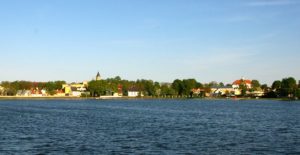
Source: Interpret Europe
Landscape
In terms of open landscapes, the Council of Europe’s Euopean Landscape Convention (Florence Convention) mirrors many of the aspects mentioned in the Faro Convention. It defines a landscape as a “basic component of the European natural and cultural heritage, contributing to human well-being and consolidation of the European identity” (Preamble).
‘Landscape’ means an area, as perceived by people, whose character is the result of the action and interaction of natural and/or human factors (Florence Convention, Article 1a).
It expresses the need to “increase awareness among the civil society, private organisations, and public authorities of the value of landscapes” (Article 6A) and it claims “participation of the general public, local and regional authorities, and other parties with an interest in the definition and implementation of the landscape policies” (Article 5c).
Alfred Toepfer Medal Winner 2019
Kaja Lotman, recipient of the Alfred Toepfer Medal 2019, in Jurmala, Latvia - EUROPARC Conference 2019
The Alfred Toepfer Medal, named after the founder of the EUROPARC Federation, Dr h.c. Alfred Toepfer (1894-1993), is awarded annually in recognition of a particular individual who has made a significant contribution to nature protection in Europe.
Congratulations! Alfred Toepfer Medal winner 2019
In 2019, the Alfred Toepfer Medal goes to Kaja Lotman, the Estonian champion in management of traditional semi-natural biotopes and conservation in a broader landscape. Among others, especially the idea of grazing on and restoring coastal meadows is attributed to Kaja Lotman as one of her most significant achievements.
“On the Estonian level, she is one of the leaders in the national meadow management scheme, and so many of our friends in Europe have learned from it,” said Nele Sõber, member of the EUROPARC Council, for the news portal ERR.
Next to her outstanding achievements in nature conservation in Estonia, she also enhanced conservation activities in various projects across Europe, including through the EUROPARC Federation network or as a member of UNEP/EUROBATS. She was the President of the EUROPARC Nordic-Baltic Section in 2012-2014 and member of EUROPARC Federation Council in 2014-2017. She currently works as a nature conservation advisor in Estonian Environmental Board.
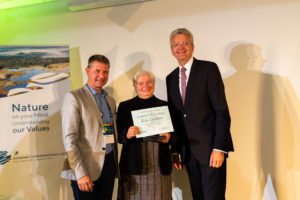
As the spokesperson for semi-natural habitat restoration and maintenance in Matsalu area, Kaja played a key role in changing Matsalu Nature Reserve into a National Park and receiving the European Charter for Sustainable Tourism in Protected Areas. She participated in launching the international Matsalu Nature Film Festival, which is celebrating its 17th anniversary this year.
It is important for conservationists to be able to explain environmental issues in an understandable way to average people. There is no end to nature conservation work.
Acknowledging the importance of youth, Kaja devoted many of her activities to involving the young generations in nature conservation: from initiating a recognition process “Young Nature Conservationist” addressing the Estonian youth since 2005, to writing a children’s book “Morning concert in Matsalu” in 2018 or visiting many Junior Ranger camps in Estonia as a lecturer.
In 2014, she initiated a regional division of the organisation Naiskodukaitse (in English Women’s voluntary defense organisation), of which she has been an active member and chairman.
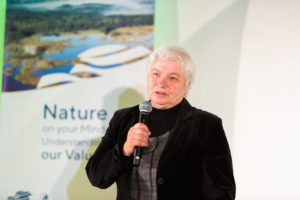
With her excellent communication skills, Kaja Lotman has been instrumental in the development of Estonian nature conservation system, especially promotion of participatory approach and cooperation networks.
Realizing that effective nature conservation works primarily in synergy between man and nature, it has always been important for her to involve the local community, i.e. the residents and tourism businesses.
“It was very easy for the jury to decide because what she has done in her own country and for the rest of Europe is a great example of nature conservation,” said Ignace Schops, president of EUROPARC Federation, for ERR.
As a recognition of her achievements in nature conservation she has been awarded with:
- 4th Class Order of the White Star by the Estonian President in 2003 ;
- Elisabeth Jidhe memorial award by the WWF with her husband Aleksei Lotman in 20013;
- Estonian Honorary Nature Conservation Badge in 2011, which is given to people with recognised merits in the fields of nature study , and spreading the knowledge on nature and developing the nature conservation nationwide as well as on international level.
You can read or listen to more media coverage on the Estonian national television, the Environmental Board, on the National radio, Newspaper Postimees, Newspaper Maaleht, Newspaper Lääne Elu, or on the Matsalu village society’s website.
